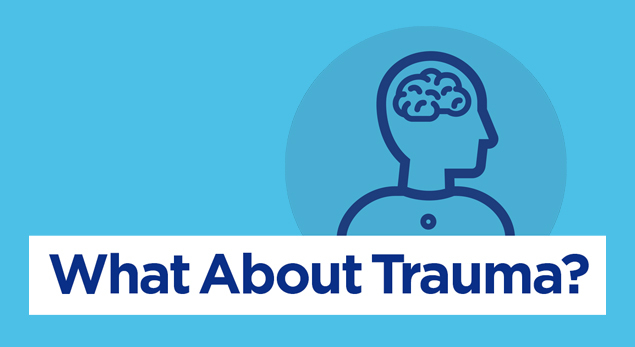We invite all Rite Aid customers to switch to the pharmacy at Evergreen!
Why Providing Care for Patients with a Lived History of Trauma Matters
September 11, 2020

Have you ever wondered why some people cannot go see a firework show or why some songs or scents bring people to tears? For many people, these are normal or even enjoyable experiences so it can be difficult to understand why some people cannot tolerate them. Although it manifests in many different ways for people, those who have a lived history of trauma can be triggered by words or sounds, situations and even human touch.
It is estimated that 60% of Americans in the United States have experienced some form of trauma and/or adverse childhood experiences (ACEs). Trauma that often affects patients’ mental health includes: abuse (mental or emotional, physical and/or sexual), violence, neglect, poverty and discrimination, amongst other adverse events. Those who have experienced serious or prolonged abuse as children may have impacted brain development, impacting their emotional behavior as adults. This rewiring of the brain can be cause for depression, anxiety and substance use disorders. People with lived histories of trauma are more likely to develop chronic diseases and behavioral health problems, including suicide.
In her TED talk, “How Childhood Trauma Affects Health Across a Lifetime,” Dr. Nadine Burke Harris explains the body’s reaction to seeing a bear in the forest. We are in shock, our cortisol kicks in and we make a quick decision of fight or flight. Then she says, “But the problem is, what happens when the bear comes home every night and this system is activated over and over again. It goes from being adaptive, or life-saving, to maladaptive, or health damaging.”
Experiencing trauma does not stop at childhood, an estimated 90% of people living with HIV have a history of trauma. Those who have a history of substance use could be using for reasons related to past trauma and they could be experiencing trauma in their relationship with substances. At Evergreen, we allow our patients to determine if they have experienced trauma; it is not for us to make that determination or judgement. Instead, we are affirming and utilize practices to make your holistic healthcare experience a positive one.
Evergreen Health recognizes the importance of creating a sense of safety for patients from the moment they walk through the doors. From the security guards to the nurses, Evergreen has adapted a service-wide trauma-informed care (TIC) approach to patients. We use the Five Intentional Tenets for TIC: safety, trustworthiness, choice, collaboration and empowerment. Safety is making sure we foster both physical and emotional sense of safety and choice allows individuals to have a clear and appropriate message about their rights and responsibilities. We work with patients using collaboration to empower patients in decision making and sharing power. Trustworthiness allows for task clarity, consistency and interpersonal boundaries. And we empower our patients by providing an atmosphere where they can feel validated and affirmed with each and every contact at Evergreen.
Another guiding value within Evergreen is harm reduction. Trauma-informed care and harm reduction share many principles, including patient collaboration, prioritizing safety and reducing risks of harm as the focus and a non-judgmental-approach. We accept that things happen in people’s lives that may contribute to addiction, symptoms and risky behavior.
In understanding the impact of trauma, not just mental health but all areas of life, we can better avoid unintentional re-traumatization. We want our patients to feel comfortable with their providers and staff. We hope that in learning to understand, “What happened to this person?” instead of “What’s wrong with this person?” will lead us into better health outcomes for our patients. If you are a patient struggling with a lived history of trauma, you can feel confident that our providers will treat you with the care and respect you deserve.
For more information about our supportive, medical and behavior services, visit our website or call us at 716-847-2441.